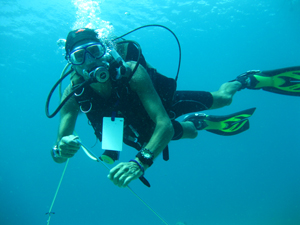Age no barrier to success
Howard Peters was 71 when he graduated with a PhD in Environmental Management & Environmental Economics on 16 July.

Howard diving
Born and raised in London, Howard has previously lived in Warwickshire and Bath before moving to York. He says: “I have a business background, first in IT and subsequently in imports, nothing that really relates to my doctoral research. However, as a passionate diver, I’ve always had an interest in the marine environment, and later I worked with a number of NGOs surveying coral reef systems around the globe for conservation initiatives. This developed into a wider interest, and to learn more I approached the leading conservation biologist in the field, Professor Callum Roberts at York, who, with Dr Julie Hawkins, enrolled me onto their new Masters course in Marine Environmental Management at the Environment Department.
“I graduated with distinction, and I was so enthused by my chosen field of study that it was proposed I undertake a PhD to research the conservation status of the marine gastropod genus Conus, known commonly as cone snails, a promising source of biologically active compounds for the development of novel drugs.”
Highlights of his PhD include organising and chairing an international workshop in Chicago to review the assessment for the IUCN Red List of all 632 species of cone snails – the first marine gastropod genus to be so assessed. This brought together a large team of Conus experts from around the world for a week of peer review. Howard’s paper ‘Conus: First Comprehensive Conservation Red List Assessment of a Marine Gastropod Mollusc Genus’ was also accepted for publication by the online scientific journal PLOS ONE.
Having returned recently from a research trip to Florida searching for new mollusc species, Howard looks forward to further work in his field.
He says: “Despite my years my research has, I believe, made a practical contribution to marine conservation science. I should like to build on the experience and expertise that York has provided, and use the important personal connections made during my studies to help secure the future of some of the most endangered of the species we assessed.”
